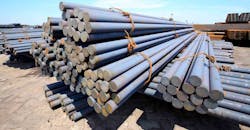Recently I was surprised when someone explained forgers’ opinions are split on the issue of steel and aluminum tariffs, that a good number of forgers and their suppliers are very much concerned by the prospect of surcharges on imports of such products, while others welcome the development. Such an idea seems irresponsible and risible to one segment of the group, long overdue and perfectly justifiable to the other.
How someone feels about tariffs in general should be fairly simple to anticipate, because most people operating in 21st Century free-market-based societies think of (or more accurately, operate as if) their commercial activity and their civil liberties are a continuum: they have a right to buy what they want, consume what they choose, think for themselves and live as they prefer, as long as nobody gets hurt. The last proviso is practically an afterthought, because how could anyone possibly be hurt by someone’s choice of what to buy or where to buy it? That’s practically the guiding philosophy among many Americans.
But among the pro-tariff people the issue of injury is taken quite literally, even personally. They can identify the injuries caused by the choices others have made to buy products from foreign suppliers, how businesses have been damaged or dissolved as a result of global competition, and how those developments have spread loss and misery to other businesses and communities, and individuals and families.
It’s only this degree of passion about the issue of global competition that gives cover to the argument that steel and aluminum imports represent a domestic security threat. It’s only the link between commercial activity and national sovereignty that allows arguments about steel and aluminum to evolve into resentments about cars and timber and milk.
Trade policies are typically understood as the result of principles, the same principles that inform politics and dictate personal habits — but the present example shows that understanding to be almost inverted: people don’t support or oppose tariffs on steel and aluminum because of what they believe (or state they believe) but rather because of how they expect to be affected by such tariffs. Some forgers and forging suppliers believe they will be economically damaged by the imposition of fees to adjust the value of the products they must buy for their business, and so they oppose the tariffs. Other forgers and forging suppliers believe they will finally achieve some relief from the “unfair” competition they have faced for years or decades.
To be more specific, the fact that there is no unity among the decision-makers and constituents of the forging industry, a business community that is exceptionally uniform in most other important ways — economic and social standing, educational and professional experiences, political allegiances — tells me that although the steel and aluminum tariffs may prove to be only a temporary economic concern, or a tactical maneuver in a political drama, people living in free-market-based societies today have been almost fully reformed in our beliefs about what is good and right. We have come to the point that we do not weigh our experiences versus the principles or ideals we may have learned or inherited. We do not weigh our choices on ethics or faith. We adhere to the strategy that rewards us best. We respond reflexively to the commercial valuation of a proposition. Is it good for me?
If it’s good for me, it must be good. If it’s not good for me, it must not be good, and so it must not be fair, and might even present a threat.
It may be that who we are or who we will become has long depended on the choices we make, but I find it discouraging to realize that now we are justified in revising such consequential matters on the basis of profit or loss.
About the Author
Robert Brooks
Editor/Content Director - Endeavor Business Media
Robert Brooks has been a business-to-business reporter, writer, editor, and columnist for more than 20 years, specializing in the primary metal and basic manufacturing industries. His work has covered a wide range of topics including process technology, resource development, material selection, product design, workforce development, and industrial market strategies, among others.
Currently, he specializes in subjects related to metal component and product design, development, and manufacturing—including castings, forgings, machined parts, and fabrications.
Brooks is a graduate of Kenyon College (B.A. English, Political Science) and Emory University (M.A. English.)

